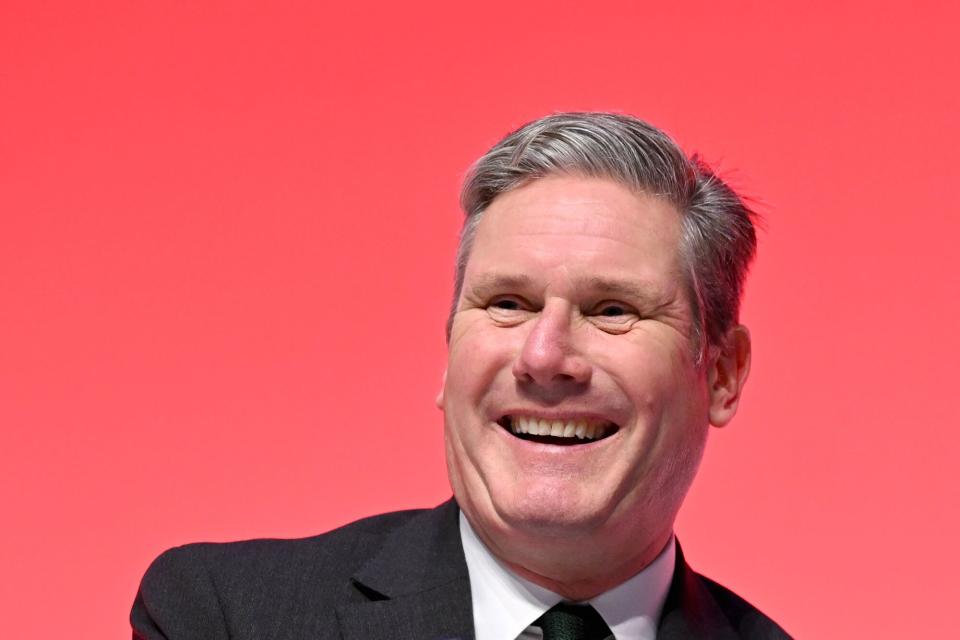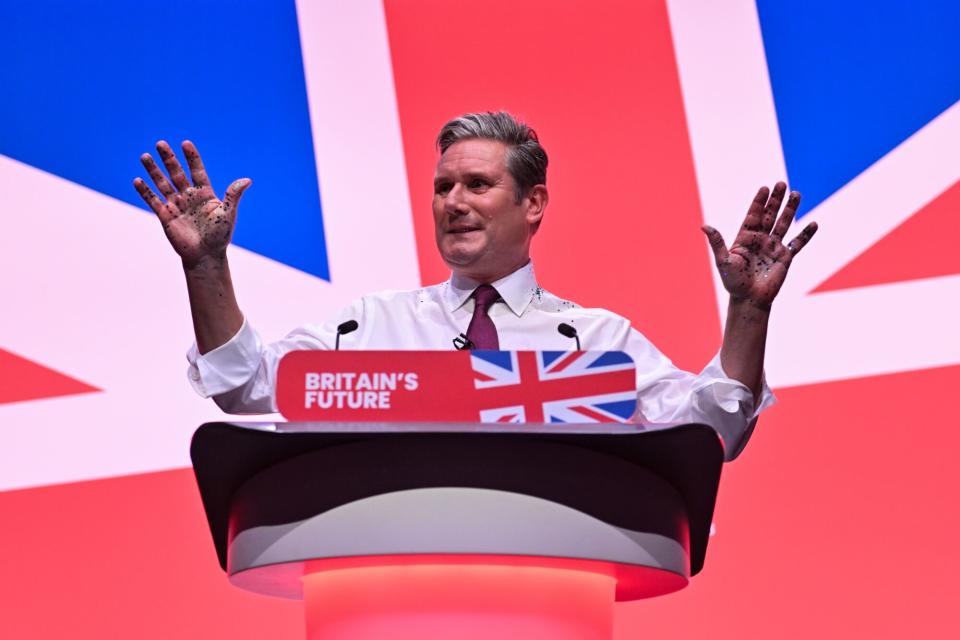Starmer Warns Labour’s Battle With Tories Has ‘Barely Begun’
- Oops!Something went wrong.Please try again later.
- Oops!Something went wrong.Please try again later.
- Oops!Something went wrong.Please try again later.
(Bloomberg) -- Keir Starmer promised a decade of national renewal after 13 years of Conservative government, urging his Labour Party to be “disciplined” and “ready to fight back” against Rishi Sunak’s Tories ahead of a general election expected next year.
Most Read from Bloomberg
Israel Latest: Israeli Death Toll in Hamas Attack Reaches 1,200
Hamas Got Around Israel’s Surveillance Prowess by Going Dark
Israel Latest: Top US General Warns Iran to Stay Out of Conflict
Afghanistan’s Viral Supercar Makes Global Debut at Doha Show
China Mulls New Stimulus, Higher Deficit to Meet Growth Goal
“This isn’t over — in fact, it’s barely begun,” Starmer told a packed hall at Labour’s annual conference on Tuesday, potentially the last such gathering before a national vote in which Labour could return to power.
There was drama at the start of his keynote speech, as a protester came on stage behind him to pour glitter over his head. “Protest or power,” Starmer said after taking off his jacket. “That’s why we changed our party.”
The four-day gathering in Liverpool, northwest England, comes at a pivotal time for Starmer as he tries to boost Labour’s profile among undecided voters and convince them he’s ready to become prime minister. Labour has adopted the tone of a government-in-waiting at an upbeat conference.
Yet there is still a sense there is more persuading to do, with an election due by January 2025 at the latest.
Starmer’s overhaul of Labour since the leadership of his left-wing predecessor Jeremy Corbyn was evident in his response to the protester. He underscored it again as he addressed the attack on Israel by militant group Hamas.
“Israel must always have the right to defend her people,” Starmer said. “I utterly condemn the senseless murder of men, women and children in cold blood by the terrorists of Hamas.” Labour activists stood to applaud.
Labour has led Rishi Sunak’s Conservatives by about 20 points in opinion polls for months, but after Corbyn led the party to its worst defeat since 1935 four years ago, the party needs another 123 seats for an outright majority.
Starmer expelled Corbyn from the parliamentary party months after taking over in 2020, and has since moved Labour closer to the center-ground of politics where he believes elections are won. During the conference, his grip over Labour was put to the test when Corbyn, who shared platforms with Hamas supporters before he became leader, repeatedly declined to condemn the militant group’s attack on Israel.
“People are looking to us because they want our wounds to heal, and we are the healers,” Starmer said. “If you think our job in 1997 was to rebuild a crumbling public realm, that in 1964 it was to modernize an economy left behind by the pace of technology, in 1945 to build a new Britain out of the trauma of collective sacrifice, then in 2024 it will have to be all three.”
In his speech, he also said Labour would:
Reform the National Health Service and get it “working around the clock,” adding: “If all we do is place the NHS on a pedestal then I’m afraid it will remain on life support.”
“Bulldoze through” rules that prevent the UK building roads, laboratories and connections to the electricity grid. “It’s time to get Britain building again,” he said.
Build the “next generation of Labour new towns” and 1.5 million new homes, without “tearing up” the green belt.
“What is broken can be repaired,” he said, promising to overhaul planning rules holding back investment in infrastructure. Labour, he said, would “hold out the hand of partnership to business.”
The immediate reaction to Starmer’s speech illustrated its broad cut-through. Trade Unions Congress General Secretary Paul Nowak lauded a “proper plan for repairing and rebuilding Britain.” More eye-opening, though, was the praise from the free-market Adam Smith Institute.
“Keir Starmer put forward a serious, innovation-focused, positive vision for the country,” said Maxwell Marlow, director of research at the institute.
Starmer pledged again to “fight the next election on economic growth,” political ground traditionally claimed by the Tories. That followed a speech that drew repeated standing ovations on Monday from Shadow Chancellor of the Exchequer Rachel Reeves who set out her priority to spur growth, including by easing planning rules on big infrastructure.
Starmer has contrasted his plan to “get Britain building” with Sunak’s decision to scrap a northern leg of the UK’s flagship high-speed rail line. The premier’s Conservative Party conference last week was marked by ministers, including Sunak, adopting the rhetoric of US-style culture wars to excite the Tory base.
“When Rishi Sunak says row back on our climate mission, I say speed ahead,” Starmer said, a reference to the prime minister’s decision to water down the UK’s green agenda. The Tories “are prepared to scorch the earth, just to get at us.”
He also accused the governing Conservatives of lying about the UK’s split from the European Union, a sensitive topic for Labour given the swathes of traditional supporters who backed Brexit and shifted to the Tories in 2019.
“They told you to your face that Brexit would only bring benefits to your business,” he said.
Entering conference, Starmer still faced a challenge to set out a compelling vision for government. Polls show that while voters are turning away from a chaotic Conservative party, they are not immediately switching to Labour. A YouGov survey last week found 28% of respondents did not intend to vote or did not know who they were going to vote for.
There’s evidence, too, that people are still unsure what Starmer stands for. “Nothing” and “don’t know” were among the most popular terms associated with Starmer in a word cloud from focus groups by think tank More in Common for the BBC. That’s worrying for Labour so close to a general election, which must be held by January 2025 at the latest.
“Our job is to shoulder the burden for working people, carry the load, not add to it,” Starmer said. “We have to be a government that takes care of the big decisions so working people have the freedom to enjoy what they love. More time, more energy, more possibility, more life.”
--With assistance from Ellen Milligan, Kitty Donaldson and Alex Wickham.
(Updates with response from trade unions, Adam Smith Institute from 12th paragraph)
Most Read from Bloomberg Businessweek
The War in Israel Shows How Social Media’s Idealistic Era Has Ended
Worst US Bond Selloff Since 1787 Marks End of Free-Money Era
©2023 Bloomberg L.P.




